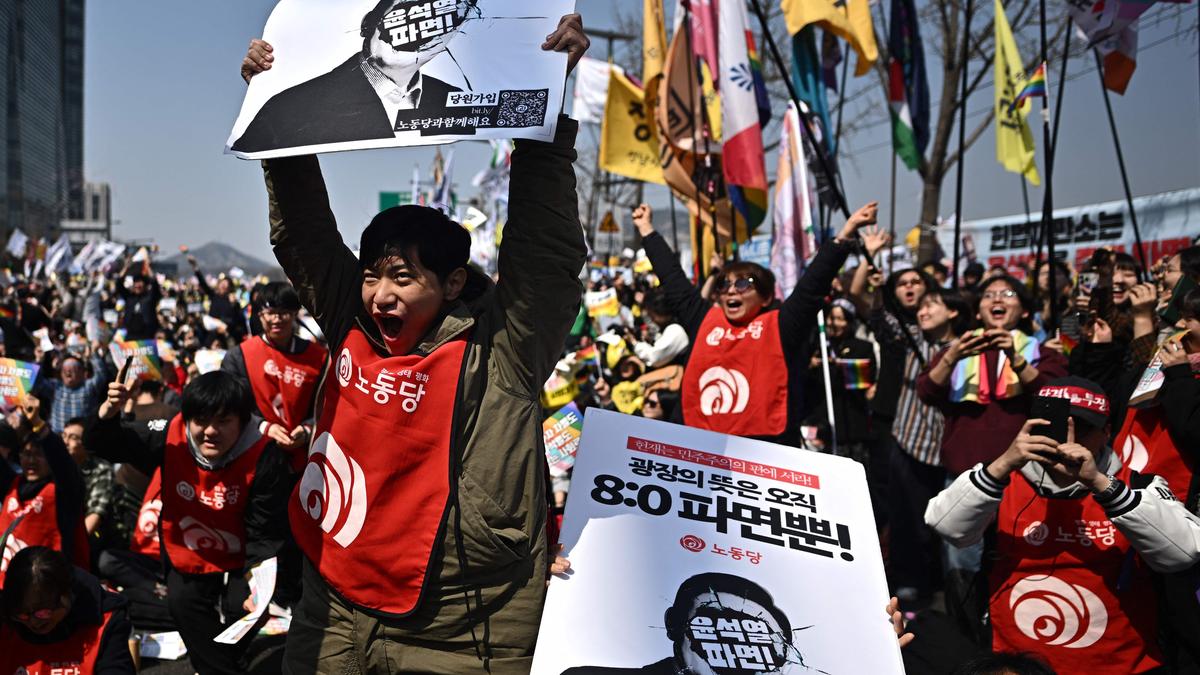
What is the current political situation in South Korea? | Explained Premium
The Hindu
South Korea's President Yoon impeached after declaring martial law, sparking protests; upcoming elections and political turmoil ahead.
The story so far: On April 4, South Korea’s constitutional court upheld the impeachment of former President Yoon Suk Yeol. The Court unanimously (8-0) agreed in favour of the impeachment. Mr. Yoon is the second president to be removed from office in the last eight years. According to the constitution, South Korea will have to elect a new President within 60 days.
Also Read: South Korea to hold snap presidential election on June 3
On December 3, 2024, President Yoon announced an emergency and declared martial law to protect South Korea from “anti-state forces” and to eliminate “despicable pro-North Koreans.” This was the 17th martial law in the history of independent South Korea. Six hours later, the National Assembly convened and 190 members voted in favour of lifting the martial law under Article 77. On December 14, 2024, in its second motion, the Assembly succeeded in voting President Yoon out of office with 204 votes in favour. Of the 300 seats in the National Assembly, the Democratic Party of Korea (DPK) holds 170, while the People’s Power Party (PPP), to which Mr. Yoon belongs, has 108 seats.
The declaration of martial law and the impeachment motion ignited public protests across South Korea. It polarised society; thousands protested against the impeachment, supporting Mr. Yoon, while 2,00,000 people gathered outside the parliament, supporting his removal. On January 17, the Corruption Investigation Office requested an arrest warrant against Mr. Yoon, which was approved, leading to Yoon supporters attacking the courthouse. The 11th and final hearing on the martial decree took place on February 25. In his last hearing, he stated that his intention was only to warn the public of anti-state forces.
The constitutional court upheld the impeachment of Mr. Yoon and expressed disillusionment with his reasoning. It held that Mr. Yoon did not follow the constitutional mandate, rules, and procedure. While Mr. Yoon argued that he imposed martial law due to the presence of anti-state forces, the verdict contradicted the same and stated that he declared martial law to overcome the National Assembly, which composed mostly of the opposition. The verdict ruled that his actions threatened the military’s political neutrality and placed the soldiers serving the nation in direct confrontation with its people.
Furthermore, the verdict argued that the political and economic cost of impeachment is more acceptable than the negative repercussions of a violated constitutional and democratic process. Mr. Yoon’s claims of alleged election fraud were also dismissed. Based on all the above, the court upheld the removal of Mr. Yoon and said he “abandoned his duty to uphold the Constitution and gravely betrayed the trust of the sovereign citizens of Korea.” Mr. Yoon will now face a series of criminal charges that he was shielded from during his tenure.
The Presidential elections will be held on June 3. As crowds of supporters and protestors clear off the streets, the interim heads and security forces are on high alert to maintain peace and order.

Okinawa marks 80 years since end of one of harshest WWII battles with pledge to share tragic history
Okinawa commemorates the Battle of Okinawa, highlighting the tragic history and impact of World War II.

 Run 3 Space | Play Space Running Game
Run 3 Space | Play Space Running Game Traffic Jam 3D | Online Racing Game
Traffic Jam 3D | Online Racing Game Duck Hunt | Play Old Classic Game
Duck Hunt | Play Old Classic Game










